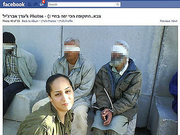1 june 2015

Eden Abergil caused a storm with a Facebook post showing her with blindfolded Palestinian prisoners.
New guidelines clearly define dos and don'ts for soldiers using Facebook, Twitter and even Whatsapp, and leave little wriggle room.
The IDF is facing a new enemy – social media. Snap-happy soldiers are sharing the more sensitive aspects of their lives online, where not everyone watching is a friend.
Soldiers are updating their lives at the base, at home, on the bus, causing a major headache for the army when statuses, photos and videos go one step too far. Now the IDF has come up with guidelines designed to create order from the chaos - and make soldiers think twice before clicking "post".
The IDF has been rocked quite a few social media storms in recent years. Just last week, five paratroopers were confined to their base for 21 days after uploading a clip of themselves dancing to Israel's Eurovision entry song "Golden Boy."
And a year ago, a row erupted after dozens of soldiers posted on Facebook images of themselves holding signs of solidarity with a Nahal soldier who had been recorded cocking his weapon at a Palestinian.
And that's not all: the height of the storm came when female soldiers posted photos in which they were naked save for their weapons, and soldier Eden Abergil uploaded an image of herself in front of bound and blindfolded Palestinian detainees, along with a caption reading, "The most beautiful period of my life."
An army document issued about a year ago, explaining military regulations regarding social media, failed to resolve the problem. But a new document has been produced by the IDF's chief education officer, Brigadier General Avner Paz-Tzuk, following consultations by the committee established by former chief of staff Benny Gantz.
This time, the IDF has penned specific "dos" and "don'ts" for soldiers that leave little wriggle room for anyone pleading ignorance. Whoever violates these rules will be prosecuted and face disciplinary punishment.
"IDF soldiers are allowed to use social networks, including the publication of photos in uniform," the document states - but goes on to add quite a few restrictions.
The central section of the document stipulates that social media users must not reveal classified information. It specifies that there are to be no photos of IDF bases, division numbers, equipment or classified troop movements. Another section commands soldiers to respect human dignity online, and bans He notes that the soldier must not impair social networks dignity of another soldier, another person or a particular group.
The new regulations also ban the publication of any content that damages an individual's privacy, and orders soldiers to safeguard the army's reputation and public image. The document says that the soldier must not show the army, military unit, division or any other aspect of the IDF in a bad light or as incompetent. Another rule specifically addresses commanders, requiring them to set a personal example and not blur the line between themselves and their soldiers, both on and off the base or the battlefield.
"If you are a division or company commander, you must remember that you do not connect with the soldiers on Whatsapp," Paz-Tzuk said, referring to the phone messaging service. "Do not post jokes there that you would not tell you are commanding them."
New guidelines clearly define dos and don'ts for soldiers using Facebook, Twitter and even Whatsapp, and leave little wriggle room.
The IDF is facing a new enemy – social media. Snap-happy soldiers are sharing the more sensitive aspects of their lives online, where not everyone watching is a friend.
Soldiers are updating their lives at the base, at home, on the bus, causing a major headache for the army when statuses, photos and videos go one step too far. Now the IDF has come up with guidelines designed to create order from the chaos - and make soldiers think twice before clicking "post".
The IDF has been rocked quite a few social media storms in recent years. Just last week, five paratroopers were confined to their base for 21 days after uploading a clip of themselves dancing to Israel's Eurovision entry song "Golden Boy."
And a year ago, a row erupted after dozens of soldiers posted on Facebook images of themselves holding signs of solidarity with a Nahal soldier who had been recorded cocking his weapon at a Palestinian.
And that's not all: the height of the storm came when female soldiers posted photos in which they were naked save for their weapons, and soldier Eden Abergil uploaded an image of herself in front of bound and blindfolded Palestinian detainees, along with a caption reading, "The most beautiful period of my life."
An army document issued about a year ago, explaining military regulations regarding social media, failed to resolve the problem. But a new document has been produced by the IDF's chief education officer, Brigadier General Avner Paz-Tzuk, following consultations by the committee established by former chief of staff Benny Gantz.
This time, the IDF has penned specific "dos" and "don'ts" for soldiers that leave little wriggle room for anyone pleading ignorance. Whoever violates these rules will be prosecuted and face disciplinary punishment.
"IDF soldiers are allowed to use social networks, including the publication of photos in uniform," the document states - but goes on to add quite a few restrictions.
The central section of the document stipulates that social media users must not reveal classified information. It specifies that there are to be no photos of IDF bases, division numbers, equipment or classified troop movements. Another section commands soldiers to respect human dignity online, and bans He notes that the soldier must not impair social networks dignity of another soldier, another person or a particular group.
The new regulations also ban the publication of any content that damages an individual's privacy, and orders soldiers to safeguard the army's reputation and public image. The document says that the soldier must not show the army, military unit, division or any other aspect of the IDF in a bad light or as incompetent. Another rule specifically addresses commanders, requiring them to set a personal example and not blur the line between themselves and their soldiers, both on and off the base or the battlefield.
"If you are a division or company commander, you must remember that you do not connect with the soldiers on Whatsapp," Paz-Tzuk said, referring to the phone messaging service. "Do not post jokes there that you would not tell you are commanding them."
28 may 2015
|
|
Five combat soldiers confined to base for 21 days after video of them dancing to 'Golden Boy' becomes a viral hit; IDF: The background was the problem.
Five IDF soldiers from an engineering battalion in the paratroopers have found themselves in trouble for a video showing them dancing to the Israeli entry to this year's Eurovision song contest. The video was a hit, but in the eyes of their commander, who sentenced them to 21 days confinement to their base. The video, which was filmed in the run-up to last Saturday's contest, shows the five dancing in formation to "Golden Boy", sung by Nadav Guedj. The song came ninth in the competition. The troops were filmed dancing, |
in armored vests and carrying their weapons, with an armored vehicle in the background. The video was filmed the West Bank, and even shows the perimeter fence.
On the last line of the chorus - "Let me show you Tel Aviv" - the song ends, and the soldier filming the video turns to the camera and jokingly says "what Tel Aviv?", followed by an expletive.
The footage was uploaded to Facebook and received thousands of shares and likes.
An IDF source said: "The video in question was filmed during life-threatening operational activities and recorded on a mobile phone, which are forbidden during operations of this nature. We stress that the soldiers were not punished for the content of the video."
According to the source, a Molotov cocktail had been thrown recently at the site at which the soldiers filmed the video, and there is hostile terrorist activity in the area.
"During the investigation by the battalion commander, the soldiers expressed remorse for their irresponsible actions," the source said.
Friends of the soldiers in the battalion were outraged by the severity of the punishment.
"They did not do it during guard duty or endanger human life. The army is overreacting," one said. "We fought in Gaza during Operation Protective Edge, and in three months we are supposed to be released from the army, so why such a severe punishment?"
The soldiers' relatives said they only made the humorous video to mark the Eurovision, and also questioned the punishment.
"They received positive responses. It presents a different side of the army, and we do not understand what is so wrong with presenting an image that can only be good for Israel in the world."
Singer Nadav Guedj also responded to the video, writing on his Facebook page: "I know that of course they should not have done it, but it is made us so happy in Austria to see them dancing and happy. So guys, as you sit in detention, I will send you the 'Golden Boy' shirts, so you can dance as civilians."
On the last line of the chorus - "Let me show you Tel Aviv" - the song ends, and the soldier filming the video turns to the camera and jokingly says "what Tel Aviv?", followed by an expletive.
The footage was uploaded to Facebook and received thousands of shares and likes.
An IDF source said: "The video in question was filmed during life-threatening operational activities and recorded on a mobile phone, which are forbidden during operations of this nature. We stress that the soldiers were not punished for the content of the video."
According to the source, a Molotov cocktail had been thrown recently at the site at which the soldiers filmed the video, and there is hostile terrorist activity in the area.
"During the investigation by the battalion commander, the soldiers expressed remorse for their irresponsible actions," the source said.
Friends of the soldiers in the battalion were outraged by the severity of the punishment.
"They did not do it during guard duty or endanger human life. The army is overreacting," one said. "We fought in Gaza during Operation Protective Edge, and in three months we are supposed to be released from the army, so why such a severe punishment?"
The soldiers' relatives said they only made the humorous video to mark the Eurovision, and also questioned the punishment.
"They received positive responses. It presents a different side of the army, and we do not understand what is so wrong with presenting an image that can only be good for Israel in the world."
Singer Nadav Guedj also responded to the video, writing on his Facebook page: "I know that of course they should not have done it, but it is made us so happy in Austria to see them dancing and happy. So guys, as you sit in detention, I will send you the 'Golden Boy' shirts, so you can dance as civilians."
26 may 2015

Israeli authorities have revoked the residency status of a Palestinian woman from East Jerusalem after having lived in the city for 23 years, less than two weeks after her husband was sentenced to nine months in an Israeli prison over activity on Facebook.
The Israeli Ministry of the Interior refused 43-year-old Muna Abdullah al-Shalabi's "family unification" application citing "security" reasons.
Her husband, Omar al-Shalabi, is the former secretary-general of Fatah in Jerusalem, and was earlier this month sentenced to nine months in an Israeli prison for allegedly inciting anti-Jewish violence and supporting "terror" in posts and comments on Facebook.
Muna al-Shalabi said that her ban from Jerusalem had been enacted to exert further pressure on her husband. Israelis authorities claim that she was given the chance to defend her application in February but that she did not come forward, leading them to refuse it.
However, al-Shalabi denied that she had been given any earlier opportunity to challenge the ban, saying that she had not received any orders from the Ministry of the Interior before the most recent one.
She has been living in the al-Suwwana neighborhood of occupied East Jerusalem since she married her Jerusalem-resident husband 23 years ago.Until the ban, she had been allowed to live in East Jerusalem through the "family unification" application process.
The process requires "meticulous examinations that often [takes] several years to complete," and has been restricted to men aged 35 and women aged 25 since 2005, according to Israeli rights group B'Tselem.
B'Tselem reported that thousands of Palestinians "are denied the possibility of even submitting a request and cannot live with their spouses in Israel," adding that the process "violates the right of tens of thousands of persons to family life."Al-Shalabi has been given 21 days to present her objections to the ban.
The residency status of 107 Palestinian residents of East Jerusalem was revoked in 2014, adding to the14,309since 1967.
The Israeli Ministry of the Interior refused 43-year-old Muna Abdullah al-Shalabi's "family unification" application citing "security" reasons.
Her husband, Omar al-Shalabi, is the former secretary-general of Fatah in Jerusalem, and was earlier this month sentenced to nine months in an Israeli prison for allegedly inciting anti-Jewish violence and supporting "terror" in posts and comments on Facebook.
Muna al-Shalabi said that her ban from Jerusalem had been enacted to exert further pressure on her husband. Israelis authorities claim that she was given the chance to defend her application in February but that she did not come forward, leading them to refuse it.
However, al-Shalabi denied that she had been given any earlier opportunity to challenge the ban, saying that she had not received any orders from the Ministry of the Interior before the most recent one.
She has been living in the al-Suwwana neighborhood of occupied East Jerusalem since she married her Jerusalem-resident husband 23 years ago.Until the ban, she had been allowed to live in East Jerusalem through the "family unification" application process.
The process requires "meticulous examinations that often [takes] several years to complete," and has been restricted to men aged 35 and women aged 25 since 2005, according to Israeli rights group B'Tselem.
B'Tselem reported that thousands of Palestinians "are denied the possibility of even submitting a request and cannot live with their spouses in Israel," adding that the process "violates the right of tens of thousands of persons to family life."Al-Shalabi has been given 21 days to present her objections to the ban.
The residency status of 107 Palestinian residents of East Jerusalem was revoked in 2014, adding to the14,309since 1967.
24 may 2015

A former Israeli high-ranking officer in the Shin Bet intelligence service committed suicide on Saturday, at his home in the 1948 Occupied territories, after a Facebook post accusing him of racism became popular and was shared thousands of times, Maariv reported Sunday.
Shortly before taking his own life the man wrote in a Facebook post that he had been wronged by the masses, told his side of the story and urged people to consider the effects of their actions and words on social media.
In a post that gained popularity last week, social-media users pointed the finger at the officer for showing racism towards a black Ethiopian Jewish lady.
In his post to Facebook on Saturday, shortly before his suicide, the former high-ranking official in the Shin Bet intelligence devices wrote that the accusations of racism had injured him deeply.
Shin Bet ex-chief Yuval Diskin meanwhile grieved over the officer’s death, claiming he knew him well and that nothing could be more hurtful to him then accusations of racism as he had always espoused treating all people equally and is, therefore, entirely the wrong target for such an attack in the media.
Observers said the suicide incident is the straw that broke the camel’s back, pointing out the inherently fragile and susceptible psyche of Israel’s stakeholders.
Shortly before taking his own life the man wrote in a Facebook post that he had been wronged by the masses, told his side of the story and urged people to consider the effects of their actions and words on social media.
In a post that gained popularity last week, social-media users pointed the finger at the officer for showing racism towards a black Ethiopian Jewish lady.
In his post to Facebook on Saturday, shortly before his suicide, the former high-ranking official in the Shin Bet intelligence devices wrote that the accusations of racism had injured him deeply.
Shin Bet ex-chief Yuval Diskin meanwhile grieved over the officer’s death, claiming he knew him well and that nothing could be more hurtful to him then accusations of racism as he had always espoused treating all people equally and is, therefore, entirely the wrong target for such an attack in the media.
Observers said the suicide incident is the straw that broke the camel’s back, pointing out the inherently fragile and susceptible psyche of Israel’s stakeholders.
22 may 2015

Israeli intelligence apparatus which offers young Palestinians in Gaza a better life in exchange for supplying it with information on the Palestinian resistance, Hamas's weapons and tunnels as well as missing Israeli soldiers
A Hamas-led Interior Ministry in Gaza yesterday issued a public warning to Palestinians in Gaza against dealing with suspicious sites believed to be operated by the Israeli intelligence that aim to recruit informants in the enclave.
The ministry said in a statement posted on Facebook: "Once you log into one of those sites, you are already on a list of potential informants."
According to the statement, the ministry will punish those found guilty of accessing the sites in question for a period ranging between seven and 11 years in prison in addition to a charge of providing information.
The ministry demanded young people avoid contact with "suspicious sites" all the time.
The sites are believed to be run by the Israeli intelligence apparatus which offers young Palestinians in Gaza a better life in exchange for supplying it with information on the Palestinian resistance, Hamas's weapons and tunnels as well as missing Israeli soldiers.
Last year, Hamas said it arrested several alleged collaborators and executed some of them.
A Hamas-led Interior Ministry in Gaza yesterday issued a public warning to Palestinians in Gaza against dealing with suspicious sites believed to be operated by the Israeli intelligence that aim to recruit informants in the enclave.
The ministry said in a statement posted on Facebook: "Once you log into one of those sites, you are already on a list of potential informants."
According to the statement, the ministry will punish those found guilty of accessing the sites in question for a period ranging between seven and 11 years in prison in addition to a charge of providing information.
The ministry demanded young people avoid contact with "suspicious sites" all the time.
The sites are believed to be run by the Israeli intelligence apparatus which offers young Palestinians in Gaza a better life in exchange for supplying it with information on the Palestinian resistance, Hamas's weapons and tunnels as well as missing Israeli soldiers.
Last year, Hamas said it arrested several alleged collaborators and executed some of them.
20 may 2015

Sami Jamal Faraj Ideis
An Israeli court on Tuesday sentenced a Palestinian man to eight months of imprisonment, with an additional six months suspended, for activity on social media.
The Jerusalem detainees' families committee said that the Israeli magistrate's court had handed the sentence to Sami Jamal Faraj Ideis, 28, from Shufat after he was convicted of inciting anti-Jewish violence and supporting "terror" in posts and comments on Facebook.
According to Ma'an News Agency, Ideis was one of eight Palestinian men detained in December 2014 in East Jerusalem under the same charges.
Their indictment said that Israeli intelligence had monitored the men's Facebook postings since last June, which intelligence said had raised tensions across Jerusalem and encouraged acts of "terrorism."
They cited in particular postings on the murder of 16-year-old Muhammad Abu Khdeir, who was kidnapped and killed by a group of Jewish extremists in July, as well as on a spate of Palestinian attacks on Israeli military and civilians that mostly took place in occupied East Jerusalem.
Ideis' sentence comes less than a week after another of the eight Palestinians detained with him -- the former secretary-general of Fatah in Jerusalem Omar al-Shalabi -- was sentenced to nine months in an Israeli prison for Facebook posts.
Two others from the group -- Adnan Ghaith, the current secretary-general of Fatah in Jerusalem, and Islam al-Natsheh -- were in April released from Israeli prisons following five months without trial.
Israelis on social media routinely and openly incite violence against Palestinians, especially during heightened periods of tensions such as this summer's military offensive on Gaza, but none have yet faced prosecution.
In recent months, the Palestinian Authority has also arrested Palestinians over postings on Facebook that have been critical of the PA and the Palestinian security services.
An Israeli court on Tuesday sentenced a Palestinian man to eight months of imprisonment, with an additional six months suspended, for activity on social media.
The Jerusalem detainees' families committee said that the Israeli magistrate's court had handed the sentence to Sami Jamal Faraj Ideis, 28, from Shufat after he was convicted of inciting anti-Jewish violence and supporting "terror" in posts and comments on Facebook.
According to Ma'an News Agency, Ideis was one of eight Palestinian men detained in December 2014 in East Jerusalem under the same charges.
Their indictment said that Israeli intelligence had monitored the men's Facebook postings since last June, which intelligence said had raised tensions across Jerusalem and encouraged acts of "terrorism."
They cited in particular postings on the murder of 16-year-old Muhammad Abu Khdeir, who was kidnapped and killed by a group of Jewish extremists in July, as well as on a spate of Palestinian attacks on Israeli military and civilians that mostly took place in occupied East Jerusalem.
Ideis' sentence comes less than a week after another of the eight Palestinians detained with him -- the former secretary-general of Fatah in Jerusalem Omar al-Shalabi -- was sentenced to nine months in an Israeli prison for Facebook posts.
Two others from the group -- Adnan Ghaith, the current secretary-general of Fatah in Jerusalem, and Islam al-Natsheh -- were in April released from Israeli prisons following five months without trial.
Israelis on social media routinely and openly incite violence against Palestinians, especially during heightened periods of tensions such as this summer's military offensive on Gaza, but none have yet faced prosecution.
In recent months, the Palestinian Authority has also arrested Palestinians over postings on Facebook that have been critical of the PA and the Palestinian security services.
12 may 2015

The former secretary-general of Fatah in Jerusalem has been sentenced to nine months in an Israeli prison for activity on social media.
The Israeli magistrate's court in Jerusalem handed the sentence to Omar al-Shalabi after he was convicted of inciting anti-Jewish violence and supporting "terror" in posts and comments on Facebook.
Al-Shalabi was one of eight Palestinian men detained in December 2014 in East Jerusalem under the same charges.Their indictment said that Israeli intelligence had monitored the men's Facebook postings since last June, after three Israeli settlers were kidnapped and killed in the occupied West Bank.
The intelligence said that their online comments had raised tensions across Jerusalem and encouraged acts of "terrorism." They cited in particular postings on the murder of 16-year-old Muhammad Abu Khdeir, who was kidnapped and killed by a group of Jewish extremists in July, as well as on a spate of Palestinian attacks on Israeli military and civilians that mostly took place in occupied East Jerusalem.
The indictment included details of the Facebook postings such the number of "likes," "shares" and "comments" by friends on Facebook.
Last month, two of the groups arrested along with al-Shalabi --Adnan Ghaith,the current secretary-general of Fatah in Jerusalem, and Islam al-Natsheh-- were released from an Israeli prison following five months without trial. Separately in April, Israeli police arrested a 17-year-old for a week for a posting on Facebook.
Hadi al-Ajlouni, who was released from prison after paying a fine of 1,000 shekels ($254), told Ma'an he was detained while leaving his house in the Old City on suspicion of planning an attack on Israelis. During his interrogation, it emerged that he was under suspicion because he had written "forgive me" on Facebook.
The teenager had written the post following an argument with his brothers, he told Ma'an. Israelis on social media routinely and openly incite violence against Palestinians, especially during heightened periods of tensions such as this summer's military offensive on Gaza, but none have yet faced prosecution.
In recent months, the Palestinian Authority has also arrested Palestinians over postings on Facebook. In November 2014, it was reported that Ayman Mahariq, a journalism student at Al-Quds University, was arrested and beaten for posting remarks critical of the security forces, while in January, Bara al-Qadi, a media student at Birzeit, was arrested for postings criticizing the Palestinian Authority.
The Israeli magistrate's court in Jerusalem handed the sentence to Omar al-Shalabi after he was convicted of inciting anti-Jewish violence and supporting "terror" in posts and comments on Facebook.
Al-Shalabi was one of eight Palestinian men detained in December 2014 in East Jerusalem under the same charges.Their indictment said that Israeli intelligence had monitored the men's Facebook postings since last June, after three Israeli settlers were kidnapped and killed in the occupied West Bank.
The intelligence said that their online comments had raised tensions across Jerusalem and encouraged acts of "terrorism." They cited in particular postings on the murder of 16-year-old Muhammad Abu Khdeir, who was kidnapped and killed by a group of Jewish extremists in July, as well as on a spate of Palestinian attacks on Israeli military and civilians that mostly took place in occupied East Jerusalem.
The indictment included details of the Facebook postings such the number of "likes," "shares" and "comments" by friends on Facebook.
Last month, two of the groups arrested along with al-Shalabi --Adnan Ghaith,the current secretary-general of Fatah in Jerusalem, and Islam al-Natsheh-- were released from an Israeli prison following five months without trial. Separately in April, Israeli police arrested a 17-year-old for a week for a posting on Facebook.
Hadi al-Ajlouni, who was released from prison after paying a fine of 1,000 shekels ($254), told Ma'an he was detained while leaving his house in the Old City on suspicion of planning an attack on Israelis. During his interrogation, it emerged that he was under suspicion because he had written "forgive me" on Facebook.
The teenager had written the post following an argument with his brothers, he told Ma'an. Israelis on social media routinely and openly incite violence against Palestinians, especially during heightened periods of tensions such as this summer's military offensive on Gaza, but none have yet faced prosecution.
In recent months, the Palestinian Authority has also arrested Palestinians over postings on Facebook. In November 2014, it was reported that Ayman Mahariq, a journalism student at Al-Quds University, was arrested and beaten for posting remarks critical of the security forces, while in January, Bara al-Qadi, a media student at Birzeit, was arrested for postings criticizing the Palestinian Authority.
8 may 2015

There are fresh concerns over the future of Israeli-Palestinian relations after an Israeli ultranationalist member of the country’s parliament, who is accused of calling for the genocide of Palestinian people, was appointed Israel’s Justice Minister.
Ayelet Shaked from the far-right HaBayit HaYehudi (Jewish Home) party was given the position as justice minister as part of a deal that saw PM Netanyahu gather enough support to form a coalition and control the Israeli parliament, the Knesset.
The decision has already stirred controversy within Israel, particularly the political Left, with Labour member of the Knesset (MK) Nachman Shai condemning the move.
"The demand to give Ayelet Shaked the Justice portfolio is like giving the Fire and Rescue Services to a pyromaniac."
Other political figures and pro-Palestinians activist groups have also criticized the move, which many have suggested will have a significantly negative impact on the already tense and strained relationship between Israel and the Palestinian people.
'This Is a War Between Two Peoples' Known for her outspoken and ultra-nationalistic views, Shaked attracted global attention and criticism in July 2014, when she posted a Facebook status denouncing Palestinians, during Israel’s 50-day military offensive in Gaza.
"The Palestinian people [have] declared war on us, and we must respond with war ... Not an operation, not a slow-moving one, not low-intensity, not controlled escalation, no destruction of terror infrastructure, no targeted killings." "Enough with the oblique references. This is a war. Words have meanings. This is a war. It is not a war against terror, and not a war against extremists, and not even a war against the Palestinian Authority.
These too are forms of avoiding reality. This is a war between two peoples. Who is the enemy? The Palestinian people."
The post, which was later deleted by Shaked and which was posted one day before a Palestinian teenager was kidnapped and burnt alive by Israeli extremists, was interpreted by many as calling for the genocide of Palestinian people, and inciting hatred between racial groups.
'Their Blood Shall Be on Their Heads'
In another Facebook post Shaked also claimed that there was no difference between those peoples involved in Palestinian terror organizations, and those within the general population, calling Palestinian children "snakes".
"Behind every terrorist stand dozens of men and women, without whom he could not engage in terrorism. Actors in the war are those who incite in mosques, who write the murderous curricula for schools, who give shelter, who provide vehicles, and all those who honor and give them their moral support. "They are all enemy combatants, and their blood shall be on all their heads.
Now this also includes the mothers of the martyrs, who send them to hell with flowers and kisses. They should follow their sons, nothing would be more just. They should go, as should the physical homes in which they raised the snakes. Otherwise, more little snakes will be raised there."
The comments attracted widespread criticism, with Turkish President Recep Tayyip Erdoğan comparing Shaked to Hitler. "If these words had been said by a Palestinian, the whole world would have denounced it," he said. The article was published by "Sputniknews" ... see the following link
Ayelet Shaked from the far-right HaBayit HaYehudi (Jewish Home) party was given the position as justice minister as part of a deal that saw PM Netanyahu gather enough support to form a coalition and control the Israeli parliament, the Knesset.
The decision has already stirred controversy within Israel, particularly the political Left, with Labour member of the Knesset (MK) Nachman Shai condemning the move.
"The demand to give Ayelet Shaked the Justice portfolio is like giving the Fire and Rescue Services to a pyromaniac."
Other political figures and pro-Palestinians activist groups have also criticized the move, which many have suggested will have a significantly negative impact on the already tense and strained relationship between Israel and the Palestinian people.
'This Is a War Between Two Peoples' Known for her outspoken and ultra-nationalistic views, Shaked attracted global attention and criticism in July 2014, when she posted a Facebook status denouncing Palestinians, during Israel’s 50-day military offensive in Gaza.
"The Palestinian people [have] declared war on us, and we must respond with war ... Not an operation, not a slow-moving one, not low-intensity, not controlled escalation, no destruction of terror infrastructure, no targeted killings." "Enough with the oblique references. This is a war. Words have meanings. This is a war. It is not a war against terror, and not a war against extremists, and not even a war against the Palestinian Authority.
These too are forms of avoiding reality. This is a war between two peoples. Who is the enemy? The Palestinian people."
The post, which was later deleted by Shaked and which was posted one day before a Palestinian teenager was kidnapped and burnt alive by Israeli extremists, was interpreted by many as calling for the genocide of Palestinian people, and inciting hatred between racial groups.
'Their Blood Shall Be on Their Heads'
In another Facebook post Shaked also claimed that there was no difference between those peoples involved in Palestinian terror organizations, and those within the general population, calling Palestinian children "snakes".
"Behind every terrorist stand dozens of men and women, without whom he could not engage in terrorism. Actors in the war are those who incite in mosques, who write the murderous curricula for schools, who give shelter, who provide vehicles, and all those who honor and give them their moral support. "They are all enemy combatants, and their blood shall be on all their heads.
Now this also includes the mothers of the martyrs, who send them to hell with flowers and kisses. They should follow their sons, nothing would be more just. They should go, as should the physical homes in which they raised the snakes. Otherwise, more little snakes will be raised there."
The comments attracted widespread criticism, with Turkish President Recep Tayyip Erdoğan comparing Shaked to Hitler. "If these words had been said by a Palestinian, the whole world would have denounced it," he said. The article was published by "Sputniknews" ... see the following link

The Palestinian security authorities has frustrated an Israeli plan to cause civil disturbance in the Gaza Strip.
Palestinian sources told al-Araby al-Jadeed newspaper that the Palestinian police in Gaza had discovered an Israeli plot to spread security chaos in the Strip through attempts to incite the public against the Hamas Movement.
According to the sources, the police found Facebook and Twitter pages managed professionally by the Shin Bet and its agents to spread rumors and cause unrest in Gaza.
The police said it started a security campaign to confront the Israeli plan and were able to arrest some people who were involved in incitement activities against Gaza.
Palestinian sources told al-Araby al-Jadeed newspaper that the Palestinian police in Gaza had discovered an Israeli plot to spread security chaos in the Strip through attempts to incite the public against the Hamas Movement.
According to the sources, the police found Facebook and Twitter pages managed professionally by the Shin Bet and its agents to spread rumors and cause unrest in Gaza.
The police said it started a security campaign to confront the Israeli plan and were able to arrest some people who were involved in incitement activities against Gaza.
1 may 2015

Instant messaging applications such as WhatsApp becoming growing threat both to battlefield secrecy and to privacy of women soldiers, military officials say.
Israel's armed forces see a growing threat in instant messaging applications – both to battlefield secrecy and to the privacy of women soldiers.
According to official military journal Bamahane, the number of troop indictments for sex crimes has almost doubled since 2012, with "infringement of privacy" counts, some involving the collection and sharing of compromising photographs, making up 35 percent of cases.
The journal cited, as one example, a soldier who photo-shopped the face of a female comrade onto an image of another woman’s nude body and pressed her into having sex with him by threatening to disseminate the image.
In another case, a non-commissioned officer was accused of surreptitiously photographing women in the shower.
WhatsApp, the instant messaging application owned by Facebook, has become particularly popular among Israeli conscripts in recent years.
The military's chief censor, Brigadier-General Sima Vaknin-Gil, said WhatsApp messaging about the Gaza war last July and August was the challenge to operational security that prompted the most discussion in meetings she held at the time with her staff. "Do I think WhatsApp is liable to be an acute problem in the future? Yes, unequivocally," Vaknin-Gil told Bamahane, predicting the power of social media would require a review of official secrecy standards in the country.
During the Gaza war, the military said it arrested several soldiers for publishing the names of casualties over the application before next-of-kin could be formally informed.
The Israeli military regards such breaches as a security risk as well as a humanitarian issue. The military has also disciplined troops for allegedly racist comments on Facebook, and in the case of a group of women soldiers, for posting photos of themselves in underwear and combat gear.
Vaknin-Gil said effectively monitoring social media activity in Israel for breaches of military law would be impossible. "First of all, it's not under my aegis," she said. "Secondly, you would have to expand the body called censorship dozens of times over in order to handle all of the existing WhatsApps groups."
The military's response appears to be mainly cautionary, for now, by playing up social media cases that lead to the stockade. "This is a very troublesome phenomenon, and soldiers don't understand how grave it is," the chief military prosecutor, Colonel Udi Ben-Eliezer, told Bamahane. "The telephone is easily available, and therefore the crime becomes very easy to do."
Israel's armed forces see a growing threat in instant messaging applications – both to battlefield secrecy and to the privacy of women soldiers.
According to official military journal Bamahane, the number of troop indictments for sex crimes has almost doubled since 2012, with "infringement of privacy" counts, some involving the collection and sharing of compromising photographs, making up 35 percent of cases.
The journal cited, as one example, a soldier who photo-shopped the face of a female comrade onto an image of another woman’s nude body and pressed her into having sex with him by threatening to disseminate the image.
In another case, a non-commissioned officer was accused of surreptitiously photographing women in the shower.
WhatsApp, the instant messaging application owned by Facebook, has become particularly popular among Israeli conscripts in recent years.
The military's chief censor, Brigadier-General Sima Vaknin-Gil, said WhatsApp messaging about the Gaza war last July and August was the challenge to operational security that prompted the most discussion in meetings she held at the time with her staff. "Do I think WhatsApp is liable to be an acute problem in the future? Yes, unequivocally," Vaknin-Gil told Bamahane, predicting the power of social media would require a review of official secrecy standards in the country.
During the Gaza war, the military said it arrested several soldiers for publishing the names of casualties over the application before next-of-kin could be formally informed.
The Israeli military regards such breaches as a security risk as well as a humanitarian issue. The military has also disciplined troops for allegedly racist comments on Facebook, and in the case of a group of women soldiers, for posting photos of themselves in underwear and combat gear.
Vaknin-Gil said effectively monitoring social media activity in Israel for breaches of military law would be impossible. "First of all, it's not under my aegis," she said. "Secondly, you would have to expand the body called censorship dozens of times over in order to handle all of the existing WhatsApps groups."
The military's response appears to be mainly cautionary, for now, by playing up social media cases that lead to the stockade. "This is a very troublesome phenomenon, and soldiers don't understand how grave it is," the chief military prosecutor, Colonel Udi Ben-Eliezer, told Bamahane. "The telephone is easily available, and therefore the crime becomes very easy to do."
17 apr 2015

American security researchers say it has discovered a four-month espionage campaign involving trick e-mails to military addresses.
Hackers have managed to penetrate computer networks associated with the Israeli military in an espionage campaign that skillfully packages existing attack software with trick emails, according to security researchers at Blue Coat Systems Inc.
The four-month-old effort, most likely by Arabic-speaking programmers, shows how the Middle East continues to be a hotbed for cyber espionage and how widely the ability to carry off such attacks has spread, the researchers said.
Waylon Grange, a researcher with the Blue Coat Systems Inc. who discovered the campaign, said the vast majority of the hackers' software was cobbled together from widely available tools, such as the remote-access Trojan called Poison Ivy.
The hackers were likely working on a budget and had no need to spend much on tailored code, Grange said, adding that most of their work appeared to have gone into so-called social engineering, or human trickery.
The hackers sent emails to various military addresses that purported to show breaking military news, or, in some cases, a clip featuring "Girls of the Israel Defense Forces." Some of the emails included attachments that established "back doors" for future access by the hackers and modules that could download and run additional programs, according to Blue Coat.
Using standard obfuscation techniques, the software was able to avoid detection by most antivirus engines, Blue Coat said. At least some software lodged inside government computers, because Blue Coat detected it "beaconing," or sending signals to the hackers that it was in place.
An Israeli defense ministry spokeswoman referred questions to the military. Military officials said they were "not aware of hacking on IDF operational networks."
Blue Coat provided Reuters with an advance look at its findings and intends to publish a paper later. The security firm, based in Sunnyvale, California, is set to be acquired by private equity firm Bain Capital LLC.
Citing confidentiality agreements with clients, Blue Coat declined to say exactly where the campaign worked, and Grange said he did not know if any vital data had been stolen.
Blue Coat surmised that the attackers spoke Arabic because some of the data recovered in the investigation showed that was the default language setting in one of the programming tools.
"Not all targeted attackers need advanced tools," Blue Coat wrote in a draft paper. "As regional conflicts continue, cyber threats from groups of various skill levels will also accompany the conventional armed conflicts."
Last month, Israeli security firm Check Point Software Technologies said it had found spying programs in 10 countries that probably originated with a governmental or political group in Lebanon that deployed them over three years.
In February, Kaspersky Lab researchers said they found what they considered the first "advanced" Arabic-speaking hacking group, which they dubbed Desert Falcons. Kaspersky said the group operated from Palestine, Egypt and Turkey and claimed about 3,000 victims in 50 countries, especially targeting military, government, media, and activist computers.
Hackers have managed to penetrate computer networks associated with the Israeli military in an espionage campaign that skillfully packages existing attack software with trick emails, according to security researchers at Blue Coat Systems Inc.
The four-month-old effort, most likely by Arabic-speaking programmers, shows how the Middle East continues to be a hotbed for cyber espionage and how widely the ability to carry off such attacks has spread, the researchers said.
Waylon Grange, a researcher with the Blue Coat Systems Inc. who discovered the campaign, said the vast majority of the hackers' software was cobbled together from widely available tools, such as the remote-access Trojan called Poison Ivy.
The hackers were likely working on a budget and had no need to spend much on tailored code, Grange said, adding that most of their work appeared to have gone into so-called social engineering, or human trickery.
The hackers sent emails to various military addresses that purported to show breaking military news, or, in some cases, a clip featuring "Girls of the Israel Defense Forces." Some of the emails included attachments that established "back doors" for future access by the hackers and modules that could download and run additional programs, according to Blue Coat.
Using standard obfuscation techniques, the software was able to avoid detection by most antivirus engines, Blue Coat said. At least some software lodged inside government computers, because Blue Coat detected it "beaconing," or sending signals to the hackers that it was in place.
An Israeli defense ministry spokeswoman referred questions to the military. Military officials said they were "not aware of hacking on IDF operational networks."
Blue Coat provided Reuters with an advance look at its findings and intends to publish a paper later. The security firm, based in Sunnyvale, California, is set to be acquired by private equity firm Bain Capital LLC.
Citing confidentiality agreements with clients, Blue Coat declined to say exactly where the campaign worked, and Grange said he did not know if any vital data had been stolen.
Blue Coat surmised that the attackers spoke Arabic because some of the data recovered in the investigation showed that was the default language setting in one of the programming tools.
"Not all targeted attackers need advanced tools," Blue Coat wrote in a draft paper. "As regional conflicts continue, cyber threats from groups of various skill levels will also accompany the conventional armed conflicts."
Last month, Israeli security firm Check Point Software Technologies said it had found spying programs in 10 countries that probably originated with a governmental or political group in Lebanon that deployed them over three years.
In February, Kaspersky Lab researchers said they found what they considered the first "advanced" Arabic-speaking hacking group, which they dubbed Desert Falcons. Kaspersky said the group operated from Palestine, Egypt and Turkey and claimed about 3,000 victims in 50 countries, especially targeting military, government, media, and activist computers.
